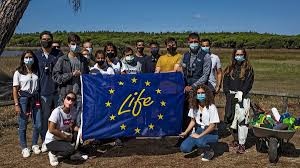EU hails benefits of multi-billion-euro environmental action

Brussels: A cost-benefit analysis by the European Commission says nearly €3.5 billion of EU money pumped into real-world environmental schemes through the LIFE programme gave a tenfold return on investment – justification, green groups say, for massively ramping up spending.
The EU’s flagship environmental protection scheme has improved the conservation status of 435 species while cutting greenhouse gas and nitrogen oxides (NOx) pollution, producing a tenfold return on the €3.46 billion invested in the seven years to 2020, the European Commission has claimed in a review of the last budget period.
The LIFE programme is the only European instrument which directly funds environmental action on the ground, with the 1,167 projects supported during the 2014-2020 period, ranging from ‘traditional’ projects like boosting vulture populations in the mountains between Greece and Bulgaria to supporting policy makers in redesigning the EU emissions trading system, which sets a cap for industrial carbon emissions.
Energy saved amounted to the average energy consumption of nearly a million European households, while carbon dioxide was cut by 11.8 million tonnes a year, equivalent to the net annual emissions of Cyprus, according to the report published on Thursday (1 August).
The yearly production of NOx, another greenhouse gas which is also linked to respiratory illness, was cut by around 152,000 tonnes – more than Portugal emitted in 2019, the EU executive noted.
A relatively small proportion of the funding was used to co-finance the purchase of 3,127 square kilometres of land at a cost of €83m, helping to expand the Natura 2000 network of protected areas, which covered some 18.6% of the EU’s land mass by 2021, according to the European Environmental Agency (EEA).
“LIFE contributed to the overall objective of moving towards an environmentally friendly economy that uses resources wisely, lowers carbon emissions, and can withstand climate changes, as well as protecting and improving the environment,” the report concludes.
The programme also succeeded in the objective of improving environmental governance (green groups and the EEA agree that EU nature legislation is broadly fit for purpose but poorly implemented) with 383 schemes specifically addressing the issue, the report notes.
It also saw some 260,000 people receive training and education, fulfilling another key objective of empowering citizens to protect the natural environment, the EU executive’s analysis concludes.
Tycho Vandermaesen, head of strategy at the WWF European Policy Office told Euronews the Commission’s analysis further bolsters the case for the EU to “massively increase” funding for nature conservation and climate action, noting the 0.3% of the EU budget channelled into the LIFE programme in 2014-2020 represented less than one euro cent a day per EU citizen.
The urgency of concrete action is set to increase following the adoption last month of the Nature Restoration Law (NRL), which sets legally binding targets to restore degraded ecosystems, while demands on the available funding could be intensified after war-ravaged Ukraine joined the scheme as a non-EU member in 2022.
“Funding for the highly efficient and effective LIFE programme should be raised to over 1% of the EU budget, alongside the creation of a new Nature Restoration Fund to address the estimated 19 billion euro annual funding gap for biodiversity until 2030 that has been identified by the Commission,” Vandermaesen said.
Five major environmental NGOs – WWF, BirdLife, the European Environmental Bureau, Euronatur and CEE Bankwatch – proposed just such a fund earlier this week, saying it would need an annual budget of between €15bn and €25bn to implement the NRL and operate the Natura 2000 network effectively.
Budget allocation to LIFE has been increased for the current seven-year period to 2027, but only to €5.4bn or about 0.5% of the total – the result of a compromise between national governments and the European Parliament, which wanted €7.3bn. The Commission’s spending proposal for 2025, tabled last month and yet to be approved by lawmakers, allocates €771m to the programme.





